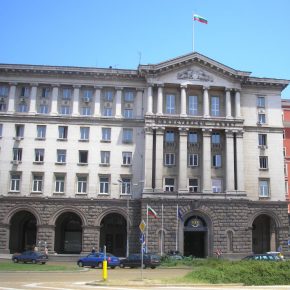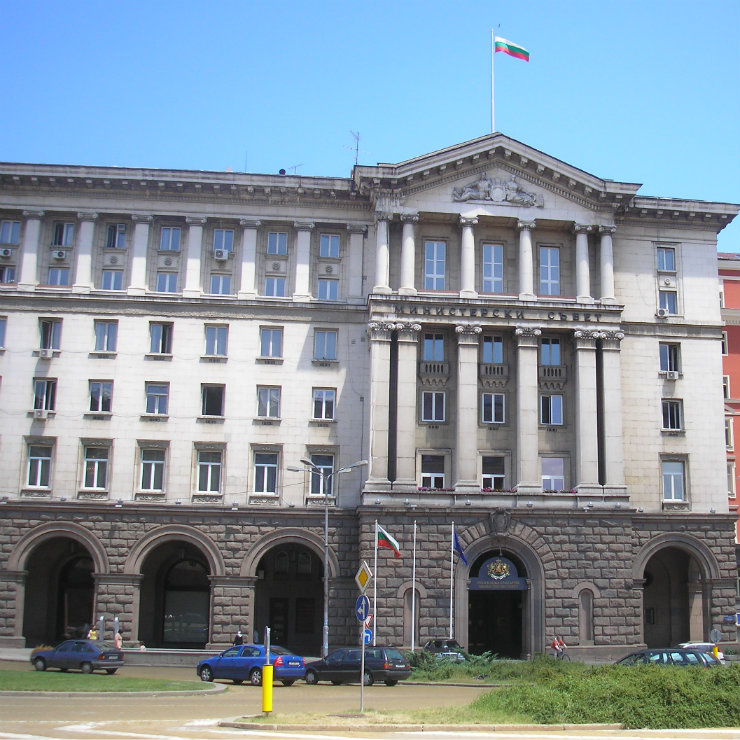
Government headquarters, Sofia, Bulgaria (Radi Sadek, CC BY-SA)
The budget is expected to reach balanced position in 2020 and 2021. Using the ESA methodology, the Finance Ministry’s forecast for the budget deficit is set at 0.2 per cent of GDP in 2019. The 2019 budget focuses primarily on increasing total expenditure by 15.1 per cent y/y, or by some record BGN5.8bn in nominal terms, to cover mostly wage increases in the public sector and to ensure higher funding in the healthcare, defense and social policy sectors.
The large-scale income and social spending is connected with the upcoming European Parliament elections and local elections. On the other hand, the justification behind the draft 2019 budget highlighted that the cabinet remains committed to continuing the fiscal consolidation and maintaining a close to balanced budget position over the mid-run. The highlight can be considered as a signal that the government remains committed to fiscal discipline. Its track record in fiscal management gives confidence in the planned mid-term budget consolidation path.
Similarly to its previous year’s budget bill, the cabinet seems to fall short of elaborating and implementing clear-cut and purposeful policies other than allocating higher funding to the most socially-sensitive sectors. Measures to improve the rising expenditure efficiency in all sectors are virtually missing, which presents a challenge in itself since reform policies will be difficult to implement one the economic expansion cycle passes. The government’s reluctance of undertaking major reforms might be related to the recent escalation of conflict within the ruling coalition.
The coalition cabinet managed to accommodate its internal differences in H1’18 thanks to the priority to keep the government’s stability during Bulgaria’s EU Presidency. The disagreements, however, deteriorated during the summer and the government’s main aim seems restricted to its survival. It may be one of the reasons why the cabinet’s reform efforts throughout 2018 and obviously in 2019 are limited only to preliminary plans for an overhaul of the healthcare system. These already met strong public opposition and as their discussion and further clarification will seemingly take longer time, the cabinet simply decided to raise the National Health Insurance Fund (NHIF) budget by 12.7 per cent y/y to BGN4.3bn in 2019.
All in all, the budget targets are realizable, provided that the Finance Ministry’s baseline scenario is not disrupted by worse-than-expected external factors. Finance Minister Vladislav Goranov already explained that the planned 0.5 per cent of GDP budget deficit represented a buffer to unforeseen external shocks that could stem from the ongoing global trade conflicts, rising commodities’ and oil prices, depreciation of the TRY, as Turkey is a major trade partner to Bulgaria. The ECB’s potential hike of the interest rates should be added as a potential risk factor to Bulgaria’s economy and consequently budget performance in the next year. Overall, there is a weakness in the budget related to insufficient precautionary measures against external risks.
On the domestic side, there are budget risks related to the situation with the state-owned companies, in particular the ailing railway company BDZ and the thermal power plant Maritsa Iztok 2, as the state budget might have to provide them further bail-out transfers over the next year. Over the mid-run, the government’s plan to relaunch the construction of the nuclear power plant Belene will also pose risks, although the cabinet currently pledges that the state will not commit to ensuring state guarantees to the future investor or to making further payments related to the plant’s equipment. The introduction of the toll system and the Sofia Airport concession are also a risk since the 2019 budget significantly relies on these revenues, while there have been numerous delays in their implementation so far.
Despite existing risks to the downside, there is a plausible chance that the general government budget will manage to generate a surplus in 2019. This is possible because the government’s investment costs are rarely spent entirely according to the budget targets, due to delays or freezing of some projects. The government pointed out that the budget’s planning was conservative, which is in line with the tradition from previous mandates to make positive budget surprises in the course of the year. The continuous surpassing of the budget balance target over the past years has started to receive negative reactions from the society and media. These are related to the fact that when the government succeeds in generating surplus surpassing the budget target, it avoids holding debates or abiding by preliminary plans and decides at its discretion on which sectors to spend the surplus. Most often, the cabinet prefers to spend the surplus money on pension bonuses, or other social and wage payments to stop different protests.
Macroeconomic environment still favorable in 2019
The Finance Ministry projects GDP growth to accelerate to 3.7 per cent y/y in 2019, 0.1pps up from the latest projection for 3.6 per cent y/y growth in 2018. GDP growth is expected to slow to 3.5 per cent y/y in 2020 and 2021. The forecast may be slightly optimistic taking into account the expected slowdown in private consumption and the further deterioration of the net exports’ negative contribution to GDP. To compare, the latest IMF forecast from the beginning of October projected a 3.1 per cent y/y GDP growth for Bulgaria in 2019, although the IMF traditionally prefers to set more conservative projections. The latest EC’s forecast from July 2018 projected 3.7 per cent GDP growth for 2019, while the World Bank’s June 2018 forecast envisaged a 3.6 per cent y/y economic growth for the year. The Bulgarian National Bank was the most optimistic, forecasting a 4.0 per cent GDP growth for 2019 in its August 2018 publication.
The economic growth acceleration in 2019 will be supported by stronger public investments and public consumption, the Finance Ministry said. The total gross fixed capital expenditure growth is expected to pick up to 9.5 per cent y/y in 2019 compared to projections for an 8.9 per cent y/y increase in 2018. The investment growth might be overestimated as the utilization of the EU projects’ funding is still at a very low level in a number of operating programs. The macro-framework expects that investment growth will be supported predominantly by the public sector, which can be viewed as a negative sign for the overall business climate in the country next year. The net exports’ negative contribution to GDP growth will increase to 2.4pps, the Finance Ministry stressed.

